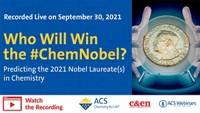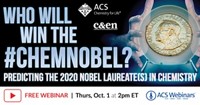Advertisement
Grab your lab coat. Let's get started
Welcome!
Welcome!
Create an account below to get 6 C&EN articles per month, receive newsletters and more - all free.
It seems this is your first time logging in online. Please enter the following information to continue.
As an ACS member you automatically get access to this site. All we need is few more details to create your reading experience.
Not you? Sign in with a different account.
Not you? Sign in with a different account.
ERROR 1
ERROR 1
ERROR 2
ERROR 2
ERROR 2
ERROR 2
ERROR 2
Password and Confirm password must match.
If you have an ACS member number, please enter it here so we can link this account to your membership. (optional)
ERROR 2
ACS values your privacy. By submitting your information, you are gaining access to C&EN and subscribing to our weekly newsletter. We use the information you provide to make your reading experience better, and we will never sell your data to third party members.
Nobel Prize
Who will win the 2019 Nobel Prize in Chemistry?
C&EN reporters and special guest panelists make their predictions during annual #ChemNobel webcast
by Laura Howes
October 1, 2019
Every year, as October approaches, the same ritual begins. Whether it’s at the departmental coffee machine or on social media, chemists discuss who might win the Nobel Prize in Chemistry during the lead-up to the official announcement. Some of the fortune telling is based on hard data—citation calculations for particular scientific discoveries—while other predictions are rooted in wishful thinking. But the guess work and debate among peers is part of the fun.
At C&EN, the staff also enjoy the #ChemNobel excitement. Last week we held our annual predictions webinar, titled “Who Will Win The #ChemNobel? Predicting the 2019 Nobel Laureate(s) in Chemistry.” Senior Editor Laura Howes and Deputy Editorial Director Lauren K. Wolf led the hour-long panel discussion about which chemists might get the call from Sweden this year.
The panelists included enzyme mastermind Alison Narayan of the University of Michigan, who is one of C&EN’s 2016 Talented 12 rising stars in chemistry, and diversity advocate Jess Wade, a physicist at Imperial College London who studies polymer-based organic light-emitting diodes. Another panelist, Steven Townsend of Vanderbilt University, who studies the molecular components of human milk and is among this year’s Talented 12, had an emergency and was unable to join the broadcast.
As well as making their predictions, the panelists and hosts discussed the fact that not all Nobel laureates have Wikipedia pages before they get the call from Sweden. Having a page on Wikipedia is typically associated with scientists who do important work, and advocates have noted that the scientists represented on Wikipedia are not diverse. So the group discussed other ways chemists can celebrate the researchers and research that drives science forward.
During the webcast, viewers voted electronically for who they thought had the best shot at the 2019 prize, based on the panelists’ predictions. The majority of the votes went once again to John B. Goodenough and others who helped develop lithium-ion batteries. CRISPR pioneers Jennifer Doudna, Emmanuelle Charpentier, and Yoshizumi Ishino also got a sizable percentage of votes.
Those results match the ongoing discussion on Twitter, where Nature Chemistry Editor in Chief Stuart Cantrill launched his own poll after the C&EN broadcast finished. Li-ion batteries and CRISPR lead the pack there too. Meanwhile, European magazine Chemistry Views ran a poll online, and its readers are rooting for astrochemist Ewine van Dishoeck; Krzysztof Matyjaszewski, the developer of atom transfer radical polymerization; and the master of metal-organic frameworks, Omar Yaghi.
For a more number-based set of predictions, Clarivate Analytics’ Web of Science group selected candidates for the Nobel Prize in Chemistry from studies in its database that have been cited more than 2,000 times. Those candidates are Rolf Huisgen and Morten Meldal for developing cycloaddition reactions, Edwin Southern for inventing the molecular biology tool the Southern blot, and Marvin Caruthers, Leroy Hood, and Michael Hunkapiller for pioneering protein and DNA sequencing and synthesis tools.
Next week, when the winners are announced on Oct. 9 in Stockholm, a lucky few will be able to claim clairvoyance. If you are yet to pick your own favorite, or if you just want to see more of C&EN’s Nobel panel discussion, you can watch the archived predictions broadcast embedded above.
Then, make sure you check in with C&EN on Oct. 9 to see if any of the predictions were right. We will be posting coverage of the 2019 Nobel Prize in Chemistry on our website and on Twitter and Facebook.
UPDATE: After years of predicting that lithium-ion batteries would win the #ChemNobel, the chemistry community has finally gotten its wish. John B. Goodenough, M. Stanley Whittingham, and Akira Yoshino have been awarded the 2019 Nobel Prize in Chemistry for their contributions to the rechargeable batteries. Read our coverage here.





Join the conversation
Contact the reporter
Submit a Letter to the Editor for publication
Engage with us on Twitter